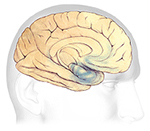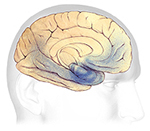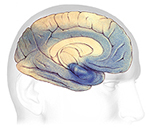|
|
Alzheimer's and the brain
Alzheimer's is not the only cause of memory loss.
Many people have trouble with memory — this does NOT mean they have Alzheimer's. There are many different causes of memory loss. If you or a loved one is experiencing symptoms of dementia, it is best to visit a doctor so the cause can be determined. | |
Microscopic changes in the brain begin long before the first signs of memory loss.
The brain has 100 billion nerve cells (neurons). Each nerve cell connects with many others to form communication networks. Groups of nerve cells have special jobs. Some are involved in thinking, learning and remembering. Others help us see, hear and smell.
To do their work, brain cells operate like tiny factories. They receive supplies, generate energy, construct equipment and get rid of waste. Cells also process and store information and communicate with other cells. Keeping everything running requires coordination as well as large amounts of fuel and oxygen.
Scientists believe Alzheimer's disease prevents parts of a cell's factory from running well. They are not sure where the trouble starts. But just like a real factory, backups and breakdowns in one system cause problems in other areas. As damage spreads, cells lose their ability to do their jobs and, eventually die, causing irreversible changes in the brain.
The role of plaques and tangles
Two abnormal structures called plaques and tangles are prime suspects in damaging and killing nerve cells.



Plaques are deposits of a protein fragment called beta-amyloid (BAY-tuh AM-uh-loyd) that build up in the spaces between nerve cells.
Tangles are twisted fibers of another protein called tau (rhymes with “wow”) that build up inside cells.
Though most people develop some plaques and tangles as they age, those with Alzheimer's tend to develop far more. They also tend to develop them in a predictable pattern, beginning in areas important for memory before spreading to other regions.
Scientists do not know exactly what role plaques and tangles play in Alzheimer's disease. Most experts believe they somehow play a critical role in blocking communication among nerve cells and disrupting processes that cells need to survive.
It's the destruction and death of nerve cells that causes memory failure, personality changes, problems carrying out daily activities and other symptoms of Alzheimer's disease.
Research and progressToday, Alzheimer's is at the forefront of biomedical research.
Researchers are working to uncover as many aspects of Alzheimer's disease andrelated dementias as possible. Ninety percent of what we know about Alzheimer's has been discovered in the last 15 years. Some of the most remarkable progress has shed light on how Alzheimer's affects the brain. The hope is this better understanding will lead to new treatments. Many potential approaches are currently under investigation worldwide.
Related Posts







